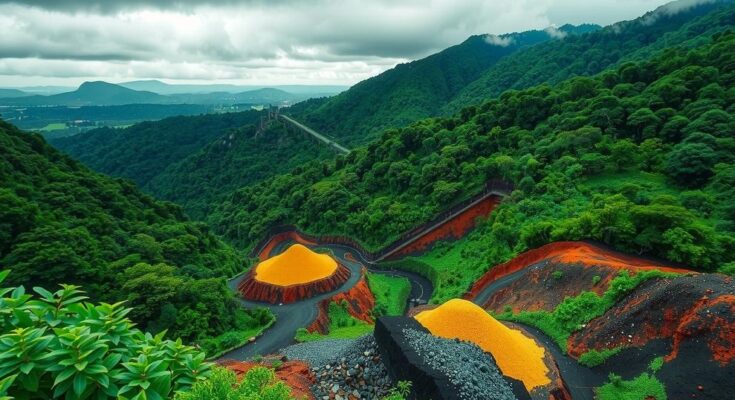The Democratic Republic of Congo faces a critical issue with illegal mining operations predominantly run by Chinese nationals, contributing to extensive humanitarian crises and environmental degradation. Despite recent attempts by local governance to regulate these operations, skepticism about significant improvement abounds. The Lobito Corridor project raises further questions about its potential impact on mining ethics and community welfare.
In the Democratic Republic of Congo (DRC), an alarming trend of illegal mining operations, particularly by Chinese nationals, has been escalating. This issue has deep historical roots, dating back to the colonial exploitation under King Leopold II. For more than three decades, since the First Congo War, these operations have significantly contributed to some of the worst humanitarian crises, with conflicts resulting in around 10 million deaths. The international community’s silence regarding the lack of transparency in the critical minerals supply chain in the DRC highlights a concerning global oversight amid the urgency for green energy transition.
South Kivu Province stands out with over 450 mining companies, predominantly run by Chinese interests. These enterprises largely flout the Congolese mining codes, operating without necessary permits and regulations. The situation has worsened with active involvement from armed groups like the M23, which has escalated violence in the region while also seizing towns rich in valuable minerals such as gold and coltan. Recently, Chinese nationals were arrested for illegal gold mining operations, yet they faced no legal ramifications following intervention from government officials.
Concerns extend beyond the economic implications. The ongoing illegal mining activities have dire consequences for local communities. A startling report noted high rates of severe malnutrition among children and significant environmental degradation. This is compounded by the lack of basic social services while these companies profit enormously. Alarming rates of schooling dropouts and ecosystem destruction further account for the deterioration of living conditions in mining areas.
In July 2024, newly-elected Governor Jean-Jacques Purusi revealed disturbing figures regarding illegal operations in South Kivu, marking one of the first serious attempts to address this chaos through governance and improved regulations. However, skepticism abounds about whether these governance improvements can yield substantial progress without support from the national government and coherent regional strategies to ensure accountability.
In this context, skepticism surrounds future initiatives such as the Lobito Corridor project, which aims to enhance ethical mineral extraction and community welfare. Skeptics question whether the project will genuinely transform the landscape of mining in the DRC or merely perpetuate existing exploitation patterns. Key questions remain: Will the project foster community involvement and environmental protections? How will it impact labor practices and transparency in the supply chain?
To resolve these pressing issues, a call for stronger governance and accountability from the Congolese government is imperative. Transparency in the extraction processes must be demanded by all stakeholders, particularly those reaping benefits from Congo’s rich mineral resources. Continued neglect towards human rights violations in the DRC remains unacceptable as the world continues to depend on its critical minerals for technological advancement.
The situation in the Democratic Republic of Congo reveals a troubling interplay between foreign mining exploits, particularly those led by Chinese nationals, ongoing conflict, and severe humanitarian consequences. Despite the staggering issues of governance, community degradation, and environmental destruction, there are flickers of hope with recent calls for regulation and transparency in the mining sector. However, without concrete support from the central government and international players, the path toward genuine improvement for local communities remains fraught with challenges. The world must not lose sight of its responsibility towards respecting human rights in the DRC’s mineral supply chain.
Original Source: www.hks.harvard.edu




